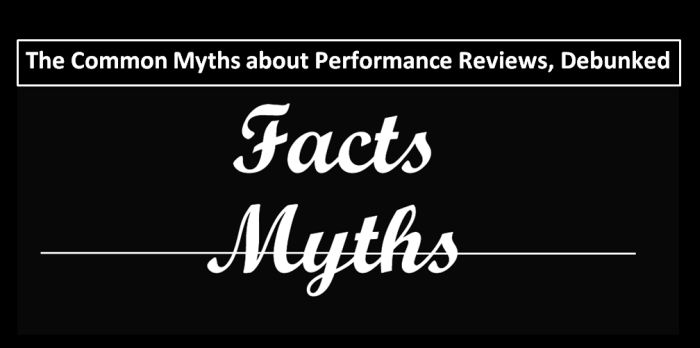What are your thoughts on performance reviews? Performance evaluation is the most ubiquitous, and one of the most popular protocols in the workplace. We recently surveyed both managers and employees and discovered the Common Myths about Performance Reviews.
While it’s true that many supervisors aren’t skillful at giving formal reviews, an annual review can be more than a necessary evil. In fact, it can be an important tool for helping you achieve your job-specific and overall career goals.
Here are top 10 performance reviews myths and the reality. Let’s debunk of them:
Table of Contents
Myth: Employees find performance reviews helpful or are a waste of time.
Certainty:
- The review can provide a wealth of helpful information—if you ask for it.
- Many organizations believe the review process ends the moment a one-on-one wraps up. If you want your reviews to be effective, you need to follow up on what’s discussed during them.
- Check in with your staff periodically to make sure they’re improving and following directions.
Myth: The longer the annual evaluation form, the more effective it is.
Certainty:
- The longer the form, the more painful it is! In an effort to appear thorough, some evaluation forms have become as painful as college entrance exams!
- The longer and more complex it is, the more managers and employees become cynical and the less likely it is to add value.
- If you are a leader, it is your job to be able to have courageous conversations without a metrics tool.
Myth: All successful organizations conduct annual performance reviews.
Certainty:
- Over the past few years, a growing number of well-known companies (including GE, Accenture, Netflix, Google, and Deloitte) have begun to re-think or eliminate the traditional approach to annual reviews.
- However, successful organizations still aim to discover the most effective ways to give thoughtful and meaningful feedback.
Myth: Managers talk and employees listen
Certainty:
- Many people think that managers need to do all the talking during employee reviews. They are most assuredly wrong. Let employees speak their mind early and often during the review process.
Myth: Annual performance reviews lead to improved performance.
Certainty:
- From our experience, there is not always a clear association between the annual review and performance.
- In fact, there is research that shows the most common approaches to the annual review can demotivate, demoralize and decrease performance.
Myth: Leaders believe the time they spend on annual reviews adds great value to the organization.
Certainty:
- Most leaders hate this process; this is sometimes due to laziness but more often due to the amount of time and complexity that has been built around them.
- According to CEB (formerly known as the Corporate Executive Board), managers spent over 200 hours a year completing reviews, and 77% of HR managers do not believe such reviews reflect the real value employees bring to an organization.
Myth: The primary motivation for annual reviews is to help the employee.
Certainty:
- More often than not, the purpose has increasingly become reducing litigation risks by keeping Human Resources files up-to-date with documentation in case someone is terminated.
- While this is important, any evaluation process should have far greater motives and benefits than just this.
Myth: Deep down, all employees want to know how they are performing.
Certainty:
- Wrong and right! Everyone needs to know how they are doing based on clear expectations and ongoing feedback.
- However, in reality, most of us humans only want to be affirmed, not critiqued.
- So don’t feel compelled to find something wrong with an employee if it isn’t something significant, something the person can actually change, or something that is essential to the organization’s vision and priorities.
Myth: Employees should know how they are doing, I shouldn’t have to tell them.
Certainty:
- You would think any intelligent leader would not believe this, but you would be wrong.
- We often hear employees say their supervisor has never told them how they are doing!
- While annual reviews are far from perfect, they do provide an opportunity for feedback and discussion.
- However, frequent discussion and feedback that flows both ways, leading to employee and employee to the leader, is even better.
Myth: Annual performance reviews are completely unbiased.
Certainty:
- Double wrong. Over the years, research has continued to show it is hard for any person or review process to be completely unbiased.
- Things like chemistry (we like people who are more like us), timing (we rate people lower if they recently had a bad event), and labels (we rate people higher if they are already viewed as successful) all can add bias to an evaluation.
- One of the best ways to guard against such bias is to periodically conduct a 360 review on both yourself and your employees.
